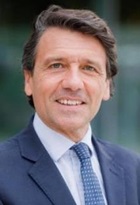|

My departing thoughts as ECNP President
There is a natural tendency to forget that we are mostly what we inherit from others, parents, family, teachers, colleagues, predecessors and so on.
I cannot start this message without saying that ECNP is what it is thanks to the endeavours and generosity of those scientists and clinicians who share a common vision: to ensure that advances in the understanding of brain function and behaviour are translated into better treatments and enhance public health.
Among all of those who preceded us I would like to highlight the previous presidents of ECNP. With their leadership they have made the history of ECNP a success story.
During the last three years as president I have had the privilege to learn from many of you things I did not know when I became president. I have especially learnt from the members of the Executive Committee during my mandate, but also from members of the different committees, the SPC, SAP, Workshops, Networks, Schools, Seminars and many others.
But let’s face it, this gigantic College with more than 50 activities running every single year would be impossible to manage without an excellent group of professionals working behind the scenes. Of course, I am referring to all the members of the ECNP Office headed by Alex Schubert.
In this, my parting presidential message, I would like to share with you some of the opportunities and challenges I see for the future of our field.
We have gone through difficult times in the last decade or two with a drop in the investment in brain research, and with the industry pulling away from CNS drug development and taking shelter in areas of medicine with a less risky investment/benefit ratio.
But I am sure that we have a future full of opportunities in front of us and we cannot afford to miss them.
We need to remind ourselves and make policy-makers and politicians aware that there are huge unmet needs in our field. At least one in four Europeans has, has had or will have a brain disorder. For some of them, that affect millions of Europeans such as Alzheimer’s or autism, we have no or almost no really efficacious pharmacologic treatments for their core symptoms. Brain disorders between the ages of 10 and 30 years of life cause more burden than all other medical disorders combined.
That we are dealing with the most complex organ is evident and the fact that we have to use that self-same organ for research on that organ is, as Einstein once stated, something that makes things even more complicated. Complex problems require complex approaches and in that simple sentence resides what I believe has been the most important ingredients in ECNP’s recipe for success.
At the ECNP Congresses – as in most of our activities – we have clinicians (psychiatrists, neurologists, psychologists, neurophysiologists, etc.) and we have scientists, professionals working in academia, in the private sector, in drug companies, in technology companies, and in SMEs, along with regulators, payers, patients, families and a huge and heterogeneous community of people who share common objectives. That is the hallmark of ECNP, and I do not see the same in any other meeting or college in the world.
We need to be ambitious and to collaborate, but that unquestionably is not enough. The recent history of neuropsychopharmacology has taught us that we have to move away from refining or polishing the same old types of drugs and mechanisms of action. As in other areas of medicine, we need to invest in avenues of research that are more risky and challenging but certainly more gratifying. We need to use scientific approaches that no longer rely on serendipity but build on the knowledge we have gathered in these last decades.
We need to identify complex and sometimes (think about neurodevelopment) moving targets. Thanks to researchers such as Karl Deisseroth, we have new tools to look into the brain and we have a much better understanding of the links between brain function or dysfunction and behaviours, symptoms and disorders.
I mentioned before that we need to be ambitious and to stop doing the same things over and over again. But at the same time I also have the impression that we are sometimes too humble and we do not recognise what we have accomplished in neuroscience and clinical advances. Let me share with you just two examples of the many I could have chosen:
- Genes and intellectual disability (ID) and autism spectrum disorder (ASD).
- Editorial in Science last month: Historically the Danish suicide rate was among the highest in the world. Due to decades of active and effective suicide prevention, today Denmark has one of the lowest suicide rates in Europe.
And that is something I also want to emphasise: we are not doing enough in terms of health prevention and primary prevention for brain disorders. Every pound invested in early intervention in psychosis pays off £18; school-based interventions to reduce bullying pay off £4.50; prevention of conduct disorders through social and emotional learning programmes pays off £83.
So the problem is not only in the amount of discovery and new findings, authors such as our keynote speaker Karl Deisseroth have published every month in 2019 one paper in either Nature, Science or Cell. The main bottleneck is in translating those findings into less burden and morbidity and into better quality of life for our citizens.
As the challenge in front of us is so huge, we need to attract the most talented researchers to our field and we need to invest in excellent training for those bright young researchers and clinicians. If there is one activity in which ECNP stands out, it is education.
One of the innovations that will transform our field is digital health. From the different perspectives of digital biomarkers, digital diagnostics and digital therapeutics we have a huge opportunity in front of us. For that reason ECNP has decided to lead the field of brain digital health. We hold an already oversubscribed meeting in Nice every year – the New Frontiers in Digital Health Meeting – that has proven to be of interest to the best experts in the field, including industry, academia, regulators and users.
This is just one example of the ample new array of careers and knowledge we have in front of us. When some months ago my 18-year-old daughter finally informed me what university career she had chosen, I learned that there were hundreds of new job titles I had not even heard of before. She ended up choosing biomedical engineering, but the list of strange names and combinations of strange names was endless: careers that have to do with physics, engineering, robotics, AI, big data, you name it. Just think about the title of the keynote session we had at the 32nd ECNP Congress in Copenhagen: ‘Linking circuit dynamics with molecular datastreams at cellular-resolution across the vertebrate brain’. Yes, we have to open our minds and be ready for a new set of techniques that will allow us to know and do things we do not at the present time even think about.
We all have decided to focus our professional lives, for one reason or another, on the most complex organ in the universe: the human brain. That forces us to go beyond biology and move into social, psychological, ethical and moral conundrums and their possible interactions. I am sure that each of you has a good reason not to have chosen simple problems to deal with in life and to have chosen the most challenging one.
I do not want to finish my last message without mentioning that, just as we invest our energy and lives to advance the knowledge of brain function and dysfunction, we should not forget that patients with brain disorders suffer more from the way society responds to those disorders than from their own disorders. And that is not fair, that is not fair at all. We have to teach the lay public, the politicians, that stigma is often more painful than brain disorders themselves.
And finally, we have to be not just good scientists and good doctors but also doctors who care for the persons who suffer from what we study. William Osler once said that the good physician treats the disease; the great physician treats the patient who has the disease.
In the era of post-truth and ‘anything goes’ we need to cultivate values – the values that make what we do worthwhile, the values that rather than seeking just immediate gain are building a better society with less brain disorders and suffering for our grandchildren.
The events in our life shape us, the choices we make define us. We have made the choice to be part of ECNP and that defines all of us.
Many thanks for being part of ECNP!

Celso Arango
Past-President |